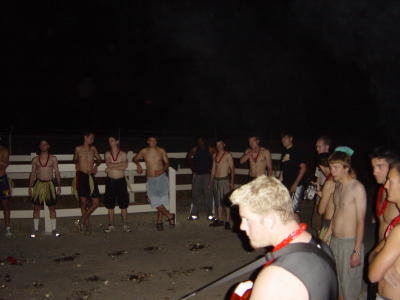Friday, September 30, 2005
Thursday, September 29, 2005
Analogy of the well-built house
Beautiful and well-built houses must have "makers": intelligent designers and builders.
The world is like a beautiful and well-built house.
Therefore, the world also must have a "maker": an intelligent Designer and Builder, God (Weston, 22).
Suppose the world has a Creator like a house does. Now, when houses are not perfect, we know who to blame: the carpenters and masons who created them. But the world is also not wholly perfect. Therefore, it would seem to follow that the Creator of the world is not perfect either. But you would consider this conclusion absurd. The only way to avoid the absurdity, however, is to reject the supposition that leads to it. Therefore, the world does not have a Creator in the way a house does (Weston, 49).
1) The Creator is not perfect, or,
2) The world does not have a Creator in the way a house does.
While I wouldn't argue that God did create the world the way a builder creates a house, Hume reveals his limitations by failing to include at least one other possibility:
3) The Creator made a perfect world but allowed it to change to a state of imperfection (a state that we observe, at present).
This movement from order to disorder would also explain why a perfectly-built house could years later be seen as not perfect. Of course, Hume may have been operating under the assumption that perfection cannot deteriorate. I would think that could be possible only in a vacuum.
Hume, David. Dialogues Concerning Natural Religion. 1779. Indianapolis: Hackett Publishing Company, 1980. Part V.
Weston, Anthony. A Rulebook for Arguments. Indianapolis: Hackett Publishing Company, 2000.
How should we be charitable?
There’s a wonderful Hasidic story of an old Rabbi in Poland, and a man came over to him and said, “You say never to say anything bad about anybody because it’s a sin in Jewish law to engage in lashon ha-ra (bad words), but I bet I can come up with somebody you can’t say a good word about.”
And the Rabbi said, “Who?”
And he said, “Atheists.”
And the Rabbi said, “No, there’s one time in your life when it’s very important to be an Atheist.”
The student was shocked for the Rabbi to say it’s important to be an Atheist. "When?”
He said, “When a poor person comes to you for charity, act as if there is no God. Act as if you are the only person on the face of the earth who can save that poor human being, and give him charity, not because God wants you to give him charity, but because that’s the right thing to do.”
(Dershowitz, Alan. "Does Organized Religion Hold Answers to the Problems of the 21st Century?" Organized Religion Debate, Franklin & Marshall College, 27 Sept. 2000.)
This brings up an important issue regarding the way Christians are to be charitable, or loving, to the people of the world, to both friends and enemies. Are we to act in such a way because God commands it, or because it is the "right thing to do"?
Through the telling of this story, Dershowitz seems to be making an argument along the lines of "Atheists have a greater capacity for true charity than do people who believe in heavenly rewards." I am using this as the basis for a thesis that I will argue against in a class paper. What are your thoughts about the issue?
Monday, September 26, 2005
Entry 1

I am doing well at school, at least when I'm not allowing myself to be distracted. I tend to get distracted easily with things that are not as important as studying. Things like blogs. A certain amount of diversion is good once in a while, but only after the important things have been looked to.
Life in a dorm is better than I thought it would be. It's nice being able to come and go as I please. Before I moved in, I had resolved not to get involved with any stupid dorm activities. I have already disobeyed that resolution.
(Stupid dorm activity)

